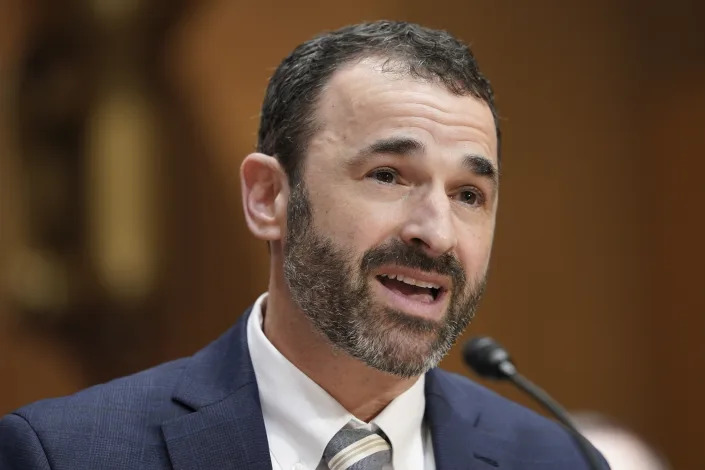
U.S. House Ways and Means Committee hearing on President Joe Biden's fiscal year 2024 Budget Request in Washington
Fri, March 10, 2023
By David Lawder
WASHINGTON (Reuters) - U.S. Treasury Secretary Janet Yellen on Friday defended a Biden administration budget request for an additional $29.1 billion in IRS enforcement funds as Republicans in Congress pressed her to explain how $80 billion funds approved last year would be spent.
The budget proposal aimed at boosting tax enforcement and collections comes on top of a fiscal 2024 appropriations request of $14.1 billion, marking an increase of $1.8 billion, or 15% over the 2023 IRS budget.
The additional IRS funding requests contained in President Joe Biden's budget plan announced on Thursday drew the ire of Republicans on the House Ways and Means Committee, where Yellen testified on Friday. The budget includes hefty tax increases on wealthy Americans and corporations to bring down deficits over the coming decade.
"You already got $80 billion for the IRS. Now you want $43.2 billion more, all without explaining what will be done with the first $80 billion," said Ways and Means Chairman Jason Smith, adding the two budget requests.
"The American people, they deserve to know how their hard earned tax dollars are being spent and the impact that a supercharged IRS will have on them," the Missouri Republican added.
Yellen said she would unveil "in the coming weeks" a promised spending plan for the $80 billion in IRS investments approved last year as part of the climate and healthcare-focused Inflation Reduction Act.
The additional $29.1 billion in long-term enforcement investments would add two more years to the $80 billion program for 2032 and 2033, according to the budget. The Treasury estimates that this would produce an additional $105 billion in net revenue from collections during those two years.
Republicans fear that the IRS will hire an "army" of 87,000 agents and harass small business owners with onerous audits, claims denied by Yellen.
She repeated her vow not to use the IRS investment funds, aimed at rebuilding the IRS' audit capabilities after more than a decade of budget cuts under past Republican-controlled Congresses, to increase audit rates for Americans and small businesses earning less than $400,000.
Yellen also said that the "vast majority" of hiring at the agency from the $80 billion would go towards replacing retiring employees over the next decade.
(Reporting by David Lawder; Editing by Emelia Sithole-Matarise)
IRS nominee Daniel Werfel confirmed by Senate vote

Daniel Werfel testifies before the Senate Finance Committee during his confirmation hearing to be the Internal Revenue Service Commissioner, Wednesday, Feb. 15, 2023, on Capitol Hill in Washington. (AP Photo/Mariam Zuhaib, File)
FATIMA HUSSEIN
Thu, March 9, 2023
WASHINGTON (AP) — The U.S. Senate confirmed Daniel Werfel to serve as commissioner of the Internal Revenue Service on Thursday by a vote of 54-42.
Werfel, who pledged before senators not to expand tax audits on businesses and households making less than $400,000 per year, will serve a five-year term as leader of the federal tax collection agency.
The approval came after the Senate agreed a day earlier to move to a final vote on Werfel’s nomination, with six Republicans breaking party ranks to back him and a lone Democrat, West Virginia Sen. Joe Manchin, voting against him.
“While Daniel Werfel is supremely qualified to serve as the IRS Commissioner, I have zero faith he will be given the autonomy to perform the job in accordance with the law and for that reason, I cannot support his nomination,” Manchin said in a statement.
President Joe Biden nominated Werfel to steer the IRS as it receives nearly $80 billion over the next 10 years through the Inflation Reduction Act, which Congress passed in August along party lines.
Previously a private consultant who led Boston Consulting Group’s global public sector practice, Werfel faced rounds of questions before the Senate Finance Committee in February on how he would spend the agency’s new infusion of money.
He drew praise for being willing to leave a private consulting job to take on the top job at the troubled agency.
Werfel will have to navigate controversy surrounding the new funding, as critics have distorted how the new law would affect the IRS and taxes for the middle class. About $46 billion was allocated for enforcing tax laws and the rest for taxpayer services, operations support and updated business systems.
Republicans have suggested without evidence that the agency would use the new money to hire an army of tax agents with weapons.
IRS officials say the new money is already being put to use — announcing Wednesday that the agency has expanded its digital scanning capabilities. The agency has scanned more than 120,000 paper forms related to unemployment taxes, a twenty-fold increase compared with all of 2022.
“This expansion of scanning is another milestone for the IRS as we work to transform the agency,” acting IRS Commissioner Doug O’Donnell said in an emailed statement.
Taking note of the potential impact of the funding, Werfel said during his confirmation hearing that “Americans rightfully expect a more modern and high-performing IRS.”
Sen. Ron Wyden, D-Ore., who chairs the Senate Finance Committee, praised Werfel's ability to receive support from Republicans for the top IRS role.
“For Mr. Werfel to get bipartisan support to lead the IRS at a time when a lot of Republicans would happily mothball the entire agency is a testament to his fairness, his ability to work with both sides and his undeniable qualification for this role," Wyden said.

Daniel Werfel testifies before the Senate Finance Committee during his confirmation hearing to be the Internal Revenue Service Commissioner, Wednesday, Feb. 15, 2023, on Capitol Hill in Washington. (AP Photo/Mariam Zuhaib, File)
FATIMA HUSSEIN
Thu, March 9, 2023
WASHINGTON (AP) — The U.S. Senate confirmed Daniel Werfel to serve as commissioner of the Internal Revenue Service on Thursday by a vote of 54-42.
Werfel, who pledged before senators not to expand tax audits on businesses and households making less than $400,000 per year, will serve a five-year term as leader of the federal tax collection agency.
The approval came after the Senate agreed a day earlier to move to a final vote on Werfel’s nomination, with six Republicans breaking party ranks to back him and a lone Democrat, West Virginia Sen. Joe Manchin, voting against him.
“While Daniel Werfel is supremely qualified to serve as the IRS Commissioner, I have zero faith he will be given the autonomy to perform the job in accordance with the law and for that reason, I cannot support his nomination,” Manchin said in a statement.
President Joe Biden nominated Werfel to steer the IRS as it receives nearly $80 billion over the next 10 years through the Inflation Reduction Act, which Congress passed in August along party lines.
Previously a private consultant who led Boston Consulting Group’s global public sector practice, Werfel faced rounds of questions before the Senate Finance Committee in February on how he would spend the agency’s new infusion of money.
He drew praise for being willing to leave a private consulting job to take on the top job at the troubled agency.
Werfel will have to navigate controversy surrounding the new funding, as critics have distorted how the new law would affect the IRS and taxes for the middle class. About $46 billion was allocated for enforcing tax laws and the rest for taxpayer services, operations support and updated business systems.
Republicans have suggested without evidence that the agency would use the new money to hire an army of tax agents with weapons.
IRS officials say the new money is already being put to use — announcing Wednesday that the agency has expanded its digital scanning capabilities. The agency has scanned more than 120,000 paper forms related to unemployment taxes, a twenty-fold increase compared with all of 2022.
“This expansion of scanning is another milestone for the IRS as we work to transform the agency,” acting IRS Commissioner Doug O’Donnell said in an emailed statement.
Taking note of the potential impact of the funding, Werfel said during his confirmation hearing that “Americans rightfully expect a more modern and high-performing IRS.”
Sen. Ron Wyden, D-Ore., who chairs the Senate Finance Committee, praised Werfel's ability to receive support from Republicans for the top IRS role.
“For Mr. Werfel to get bipartisan support to lead the IRS at a time when a lot of Republicans would happily mothball the entire agency is a testament to his fairness, his ability to work with both sides and his undeniable qualification for this role," Wyden said.
No comments:
Post a Comment